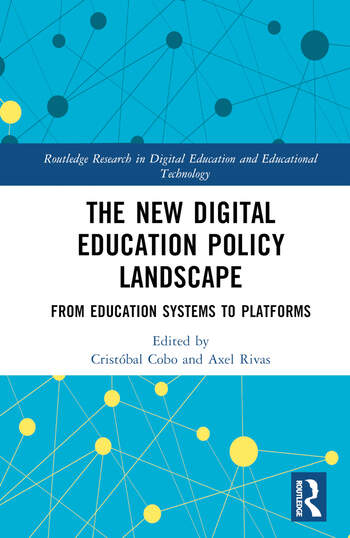New book: "The New Digital Education Policy Landscape"
New book: "The New Digital Education Policy Landscape: From Education Systems to Platforms". Edited By Cristóbal Cobo and Axel Rivas.
A book about education systems, policies, and digital transformation in the era of AI and datification, featuring voices from the Netherlands, India, Uruguay, the UK, Argentina, Spain, Belgium, Chile, USA, and beyond.
See table of contents and authors at the end. This book explore the following questions:
- What are the challenges in leveraging ICT to transform education?
- How can ICT be used to enhance teaching and learning?
- What policies are needed to support the effective use of ICT in education?
- How can stakeholders be engaged in the development and implementation of ICT policies?
- What is the role of international organizations in supporting the use of ICT in education?
Summary of the book:
The publication "Transforming Education: The Power of ICT Policies" aims to explore the role of information and communication technologies (ICT) in transforming education.
The publication identifies a number of key challenges in leveraging ICT to transform education. One of the main challenges is ensuring that all students have access to ICT tools and infrastructure, particularly in low-income countries. Another challenge is ensuring that teachers are equipped with the necessary skills to effectively integrate ICT into their teaching practices. The publication also highlights the importance of ensuring that ICT is used in a pedagogically sound manner, rather than simply as a substitute for traditional teaching methods.
The publication recommends a number of policy changes to address these challenges. These include investing in ICT infrastructure and teacher training, as well as developing policies to ensure that ICT is used in a pedagogically sound manner. The publication also highlights the importance of involving all stakeholders in the development and implementation of ICT policies, including teachers, students, parents, and the wider community.
It provides a selection of empirical studies on the new digital educational policy, and an analysis of the real opportunities and concerns that governments face (...) Gathering purposeful thinking that creates space for design solutions and rethinking educational systems considering these new technological artefacts, it will appeal to researchers and specialists in the fields of educational technology and educational policy.
Overall, the publication argues that ICT has the potential to transform education, but that significant policy changes are required to fully realize this potential. The publication provides a useful overview of the challenges and opportunities associated with ICT in education, and offers valuable insights into the policy changes required to leverage this technology to its full potential.
| Chapter | Authors | Key Topics |
|---|---|---|
| 1 | Niels Kerssens and José van Dijck | Platformization of primary education in the Netherlands |
| 2 | Kashvi U. Shetty and Pranjal Mishra | India's educational sector: Path towards digital multiply |
| 3 | Miguel Brechner | Technology as an accelerator of pedagogies |
| 4 | Elena Arias Ortiz, Cecilia Giambruno, and Marcelo Perez-Alfaro | Education management as a platform in Latin America and the Caribbean |
| 5 | Sheila Jagannathan | Learning platforms for shaping the future of education |
| 6 | Lanze Vanermen, Joris Vlieghe, and Mathias Decuypere | Reimagining 'access' to education platforms as a socio-material practice |
| 7 | Emiliano Grimaldi, Stephen J. Ball and Francesca Peruzzo | Platformization and the neoliberal moral economy of education |
| 8 | Alejandro Artopoulos | Platformization of education in the Global South |
| 9 | Francesc Pedró | Promise and perils of the platformization of higher education |
| 10 | Axel Rivas | Mapping the new directions of hybrid education systems |
| 11 | Cristóbal Cobo and Pablo Rivera-Vargas | Algorithmic education and new capacities for education institutions |
.....................
Pre-Print: Cobo, C., & Rivera-Vargas, P. (2023).What is "algorithmic education" and why do education institutions need to consolidate new capacities?.

Posted on May 09, 2023





